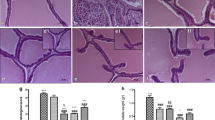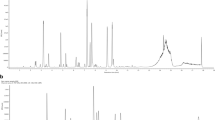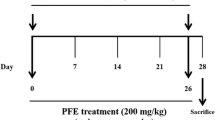Abstract
Despite much recent progress in prostate research, Benign prostatic hyperplasia (BPH) and prostate cancer continue to represent major causes of morbidity and mortality in men. In our ongoing search of natural alternatives to treat these prostate diseases, ethnobotanical reports indicated the use of Irvingia excelsa in the treatment of prostate inflammation and tumors in Cameroun. To investigate this claim, the cytotoxicity of the plant extract was investigated using MTT assay in three prostate cancer cell lines (LNCaP, DU145 and PC3). In addition, tumor cell growth/proliferation, clonogenic assay and cell cycle analyses were also assessed. In vivo, testosterone-induced benign prostatic hyperplasia (BPH) rats were treated orally with the extract (75, 150 and 300 mg/kg BW) or permixon (50 mg/kg) as standard for 28 days. Irvingia excelsa extract at concentrations of 50, 100 and 500 μg/mL significantly inhibited LNCaP, DU145 and PC3 prostate cancer cell growth and proliferation. The number of PC3 and DU145 clones was considerably diminished in a concentration-dependent manner. In addition, there was increase in the number of S-phase cells and decrease in the number of G0/G1 cells. Meanwhile results from in vivo study showed that I. excelsa extract significantly reduced prostate relative wet weight/volume and prostatic epithelium thickness at all tested doses with an optimal effect at 300 mg/kg BW. These results suggest that I. excelsa extract has in vitro and in vivo antiproliferative properties, which could justify its use by Cameroonian people to alleviate or treat prostate inflammation and tumors.



Similar content being viewed by others

Abbreviations
- AR:
-
Androgen receptor
- BPH:
-
Benign prostatic hyperplasia
- BW:
-
Body weight
- ELISA:
-
Enzyme-linked immunosorbent assay
- DMSO:
-
Dimethylsulfoxide
- DHT:
-
Dihydrotestosterone
- FBS:
-
Fetal bovine serum
- HEPES:
-
4-(2-hydroxyethyl)-1-piperazineethanesulfonic acid
- MTT:
-
3-(4,5-dimethylthiazol-2-yl)-2,5-diphenyltetrazolium bromide
- NHC:
-
National Herbarium of Cameroon
- PI:
-
Propidium iodide
- RPMI:
-
Roswell Park Memorial Institute médium
- RT:
-
Real temperature
- SEM:
-
Standard error of mean
References
Adsul P, Wray R, Spradling K, Darwish O, Weaver N, Siddiqui S (2015) Systematic review of decision aids for newly diagnosed prostate cancer patients making treatment decisions. J Urol 194:1247–1252. https://doi.org/10.1016/j.juro.2015.05.093
Agrawal M, Nahata A, Dixit VK (2012) Protective effects of Echinops echinatus on testosterone-induced prostatic hyperplasia in rats. Eur J Integr Med 4:177–185. https://doi.org/10.1016/j.eujim.2012.01.004
Asaah EK, Tchoundjeu Z, Leakey RRB, Takousting B, Njong J, Edang I (2011) Trees, agroforestry and multifunctional agriculture in Cameroon. Int J Agr Sustain 9:110–119. https://doi.org/10.3763/ijas.2010.0553
Ateba SB, Mvondo MA, Ngeu ST, Tchoumtchoua J, Awounfack CF, Njamen D, Krenn L (2018) Natural terpenoids against female breast cancer: a 5-year recent research. Curr Med Chem 25:3162–3213. https://doi.org/10.2174/0929867325666180214110932
Borowski E, Bontemps-Gracz MM, Piwkowska A (2005) Strategies for overcoming ABC-transporters-mediated multidrug resistance (MDR) of tumor cells. Acta Biochim Pol 52:609–627. https://doi.org/10.18388/abp.2005_3421
Bouquet A (1969) Traditional doctors and traditional medecines of Congo Brazzaville. Orston, Paris, p 220
Butler MS, Robinson AAB, Cooper MA (2014) Natural product and natural product derived drugs in clinical trials. Nat Prod Rep 31:1612–1661. https://doi.org/10.1039/C4NP00064A
Carson C, Rittmaster R (2003) The role of dihydrotestosterone in benign prostatic hyperplasia. Urology 61:2–7. https://doi.org/10.1016/S0090-4295(03)00045-1
Cho SD, Li G, Hu H, Jiang C, Kang KS, Lee YS, Kim SH, Lu J (2005) Involvement of c-Jun N-terminal kinase in G2/M arrest and caspase-mediated apoptosis induced by sulforaphane in DU145 prostate cancer cells. Nutr Cancer 52:213–224. https://doi.org/10.1207/s15327914nc5202_11
De Nunzio C, Kramer G, Marberger M, Montironi R, Nelson W, Schroder F, Sciarra A, Tubaro A (2011) The controversial relationship between benign prostatic hyperplasia and prostate cancer: the role of inflammation. Eur Urol 60:106–117. https://doi.org/10.1016/j.eururo.2011.03.055
Füllhase C, Schneider MP (2016) 5-alpha-Reductase inhibitors and combination therapy. Urol Clin North Am 43:325–336. https://doi.org/10.1016/j.ucl.2016.04.003
Gonzales GF (2001) Function of seminal vesicles and their role in male fertility. Asian J of Androl 3:251–258
Gornall AG, Bardawill CJ, David MM (1949) Determination of serum proteins by means of the buiret rection. J Biol Chem 58:685–704
Kim KS, Seok H, Park JH, Jeon SH, Kang SW, Lee BC, Yi J, Song SY, Lee SH, Kim YO, Chung JH (2015) Inhibitory effect of curcumin on testosterone induced benign prostatic hyperplasia rat model. BMC Compl Altern Med 15:38–40. https://doi.org/10.1186/s12906-015-0825-y
Kouakou K, Benie T (2003) Effet antifertilisant de Daldinia concentrica et Psathyrella efflorescens. Recherche des effets œstrogéniques Ethnopharmacologia 31:45–57
Linja MJ, Savinainen KJ, Saramäki OR, Tammela TLJ, Vessella RL, Visakorpi T (2001) Amplification and overexpression of androgen receptor gene in hormone-refractory prostate Cancer. Cancer Res 61:3550–3555
Nahata A (2017) 5α-Reductase inhibitors in the treatment of benign prostatic hyperplasia: a review. J Urol Ren Dis 2017:153–158. https://doi.org/10.29011/2575-7903.000053
Nahata A, Dixit VK (2011) Sphaeranthus indicus attenuates testosterone induced prostatic hypertrophy in albino rats. Phytother Res 25:1839–1848. https://doi.org/10.1002/ptr.3497
Nahata A, Dixit VK (2012a) Ameliorative effects of stinging nettle (Urtica dioica) on testosterone induced prostatic hyperplasia in rats. Andrologia 44:396–409. https://doi.org/10.1111/j.1439-0272.2011.01197.x
Nahata A, Dixit VK (2012b) Ganoderma lucidum is an inhibitor of testosterone induced prostatic hyperplasia in rats. Andrologia 44:160–174. https://doi.org/10.1111/j.1439-0272.2010.01155.x
Nahata A, Dixit VK (2014) Evaluation of 5α-reductase inhibitory activity of certain herbs useful as antiandrogens. Andrologia 46:592–601. https://doi.org/10.1111/and.12115
Newman DJ, Cragg GM (2016) Natural products as sources of new drugs from 1981 to 2014. J Nat Prod 79:629–661. https://doi.org/10.1021/acs.jnatprod.5b01055
Pais P (2010) Potency of a novel saw palmetto extract, SPET-085, for inhibition of 5-alphareductase II. Adv Ther 27:555–563. https://doi.org/10.1007/s12325-010-0041-6
Patel ND, Parsons JK (2014) Epidemiology and etiology of benign prostatic hyperplasia and bladder outlet obstruction. Indian J Urol 30:170–176. https://doi.org/10.4103/0970-1591.126900
Paubert-Braquet M, Richardson FO, Servent-Saez N, Gordon CW, Monge MC, Bazan GN, Authie D (1996) Effect of serenoa repens extract (permixon) on estradiol/testosterone-induced experimental prostate enlargement in the rat. Pharmacol Res 34:171–179. https://doi.org/10.1006/phrs.1996.0085
Rahul KD, Manisha BK, Vijay R (2014) Inhibitory effects by ayurvedic plants on prostate enlargement induced in rats. Pharm Res 6:127–132. https://doi.org/10.4103/0974-8490.129031
Sibert L, Kuhn JM, Rossi D, Tostain J (2004) Interactions médicamenteuses avec l’équilibre androgénique de l’homme adulte. Prog Urol 14:679–683 http://pascal-francis.inist.fr/vibad/index.php?action=getRecordDetail&idt=16319634
Siegel RL, Miller KD, Jemal A (2018) Cancer statistics, 2018. CA Cancer J Clin 68:7–30. https://doi.org/10.3322/caac.21332
Tan MH, Li J, Xu HE, Melcher K, Yong EL (2015) Androgen receptor: structure, role in prostate cancer and drug discovery. Acta Pharmacol Sin 36:3–23. https://doi.org/10.1038/aps.2014.18
Weyermann J, Lochmann D, Zimmer A (2005) A practical note on the use of cytotoxicity assays. Int J Pharm 288:369–376. https://doi.org/10.1016/j.ijpharm.2004.09.018
Acknowledgments
The authors are really thankful to the German Academic Exchange Service (DAAD) and the Alexander von Humboldt Foundation for support.
Consent for publication
Not applicable.
Consent to participate
Not applicable.
Availability of data and materials
The data and materials used in this study are available upon request from the authors. Please contact Prof. Dr. Stephane Zingue (stephanezingue@gmail.com).
Code availibity
Not applicable.
Funding
Not applicable.
Author information
Authors and Affiliations
Contributions
ND, ZS and RB designed the experiments. NTD performed the phytochemical analysis. ND, RJ, MS and JE performed the in vitro experiments. ZS, BYB and ACF performed the in vivo experiments. ND, RJ, MS, ZS and BR analyzed the data. All authors read and approved the final version of the manuscript.
Corresponding authors
Ethics declarations
Ethics approval and consent to participate
Housing of animals and all experiments were approved by the Cameroon Institutional National Ethic Committee, which adopted all procedures recommended by the European Union on the protection of animals used for scientific purposes.
Competing interests
Authors declare no conflict of interest.
Additional information
Publisher’s note
Springer Nature remains neutral with regard to jurisdictional claims in published maps and institutional affiliations.
Electronic supplementary material
ESM 1
(DOC 62 kb)
Rights and permissions
About this article
Cite this article
Njamen, D., Bakam, B.Y., Rutz, J. et al. Irvingia excelsa Mildbr. ethanolic extract displays in vitro cytotoxic effects on prostate cancer cells and prevents benign prostatic hyperplasia in Wistar rats. Biologia 75, 2053–2062 (2020). https://doi.org/10.2478/s11756-020-00511-0
Received:
Accepted:
Published:
Issue Date:
DOI: https://doi.org/10.2478/s11756-020-00511-0



